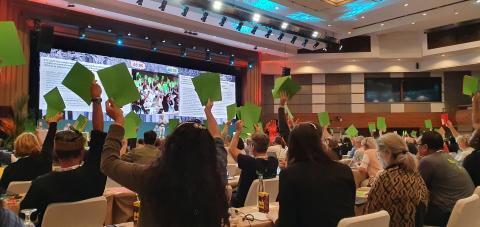Knowledge on FLEGT – first step to compliance
On 30 August 2016, NEPCon and our Vietnamese partner SFMI launched an online training platform on FLEGT - the EU’s programme aimed at combatting illegal logging, improving forest management and promoting legal timber trade.
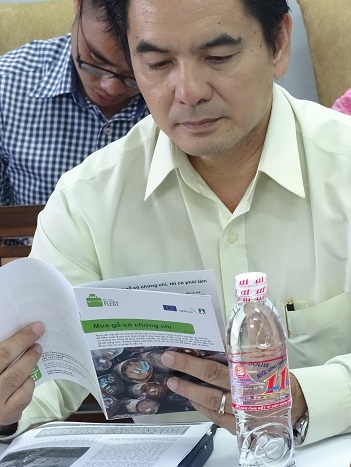 Freely accessible at flegt-tools.org/toolkit-and-training-centre, this training platform provides knowledge and ready-to-use tools on timber legality for Vietnamese timber enterprises and relevant stakeholders.
Freely accessible at flegt-tools.org/toolkit-and-training-centre, this training platform provides knowledge and ready-to-use tools on timber legality for Vietnamese timber enterprises and relevant stakeholders.
It comprises of an explanation of FLEGT (Forest Law Enforcement, Governance and Trade) and one of the plan’s key components: the European Union Timber Regulation (EUTR) which aims to prevent illegally harvested timber entering the EU market. The platform also demystifies how and why timber companies should manage timber and timber products throughout their supply chain in order to make accurate claims on the content of their timber materials.
This platform, available in both English and Vietnamese, is among many other outputs by the project “Increasing capacity of civil society organisations (CSOs) and small and medium sized enterprises (SMEs) to implement FLEGT requirements”. NEPCon and a local organisation SFMI (Research Institute for Sustainable Forest Management and Forest Certification) have implemented this project since March 2014.
The EU and NEPCon have co-funded this three-year project to ultimately support timber companies, particularly small and medium sized enterprises (SMEs) to better comply with the applicable requirements towards the legal timber trade.
Get to grips with FLEGT
Vietnam and the EU are taking a series of steps to move closer to concluding the FLEGT VPA (Voluntary Partnership Agreement). This binding trade agreement aims to ensure timber and timber products exported to the EU from Vietnam come from legal sources. It also encourages timber-producing-countries to improve regulation and governance of the forestry sector. The Agreement is expected to be signed by end of 2016, as announced by top leaders.
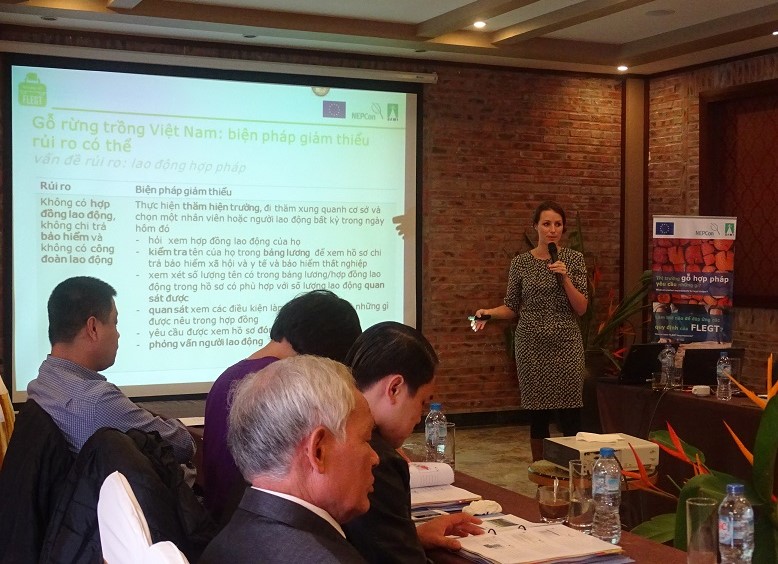
The future context entails the Vietnamese timber sector, who are impacted by the new regulations, to take in information on the FLEGT process. They need to know what requirements apply to them and the possible impacts on their business in the long run.
In the FLEGT process, CSOs - organisations working closely with timber companies on the ground, such as timber associations, NGOs (non-governmental organsations) implementing FLEGT related projects, appear to be practical supporters to timber enterprises within their reach. Thanks to the work of such organisations and the media coverage on FLEGT in recent years, ‘FLEGT’ is now not an unfamiliar word to many timber companies as it was a few years ago.
“We have kept reminding ourselves of what an SME in Dong Nai Province – one of the timber processing hubs in the country, told us when we first visited and met with the local companies in the province around two years ago”, said Ann Weddle, Project Manager from NEPCon.
“The director of that small furniture company came to us after the meeting and said it was the first time he heard about ‘FLEGT’,” she remembered.
“This has urged our team to do more and more so many more companies could get the information and support they need on the verge of FLEGT implementation,” Ms Weddle added.
From the first year, the project has kept a strict schedule sending monthly updates and related news on FLEGT and timber legality to timber companies, associations and other stakeholders in the timber sector. Nearly 500 subscribers are on the list. In addition, the project Facebook page has attracted more than 1000 people following news on FLEGT and timber legality.
And a grasp of EUTR and CoC is a must
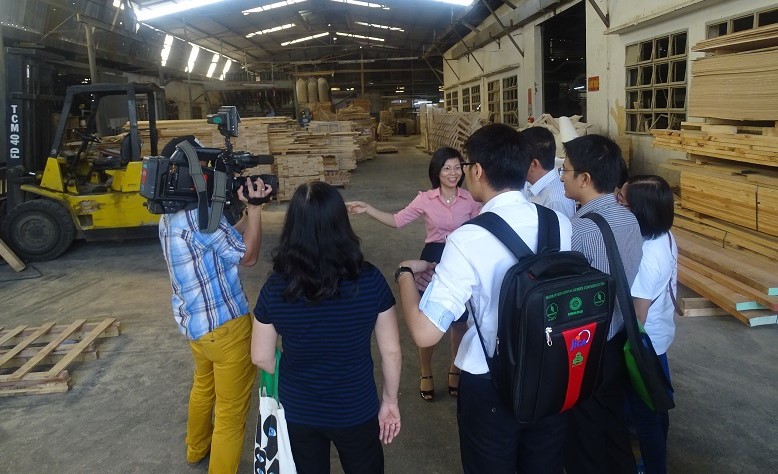
In December 2015, the project kick started its FLEGT training programme with the first training for associations, timber companies and NGOs in the North.
Simply knowing what ‘FLEGT’ stands for is insufficient. Stakeholders need to be aware of how the VPA process interacts with other components of the overarching EU Action Plan and what some of the core concepts are.
“We have found that having a better understanding of the EUTR and CoC has enabled our trainees to have a better grasp on the whole FLEGT Action Plan and what it means for the Vietnamese timber industry”, explained Ms Weddle.
The EUTR is a regulation that is already in force across the EU and it requires companies within the EU to conduct ‘due diligence’, a risk evaluation exercise on the timber and timber products they import from outside the EU. The objective is to minimise the risk of importing timber that has been illegally harvested in the country of origin.
Once the VPA is fully implemented all shipments of timber products, if passing the inspection, will be issued with a FLEGT licence, for which European buyers will not need to conduct due diligence.
Until then, Vietnamese companies continue to be requested to provide information and evidence of legality for the products they sell into the EU market, as their EU buyers exercise their EUTR obligation. This then has a ripple effect up the supply chain to the forest, when Vietnamese companies start to ask their suppliers about the legal origin of the raw materials.
The training materials explain what is involved with the due diligence process and illustrate how complicated it can be and how it can impact Vietnamese producers. Ms Weddle affirmed, “We want to show our trainees how beneficial it will be for the timber industry that Vietnam implements the VPA”.
“The prospect of not having to conduct due diligence on imports from Vietnam is a tantalising one for European buyers and will make Vietnam a very attractive producer on the global timber market”, she stressed.
Implementing a VPA, however, is not straightforward. The process will put pressure on the local industry as relevant laws are updated and stringent checks are established in the Timber Legality Assurance System (TLAS) – one of the main elements of the VPA.
Whilst the VNTLAS has yet to be finalised, the training materials explain the overall concept, along with examples from other VPA countries, so stakeholders have an idea of what to expect in Vietnam.
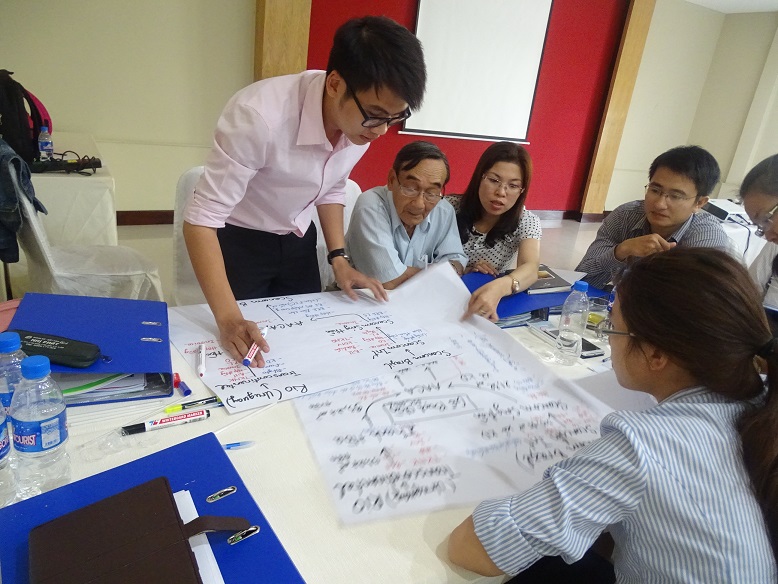
CoC is an important concept for timber businesses. Throughout meetings and field visits to SMEs, the project team have seen many companies, especially those already exporting to the EU, are familiar with the term CoC through voluntary certification schemes such as FSC (Forest Stewardship Council).
“But many do need a fuller understanding. They need to be aware of its meaning and applicability in the wider context of timber legality and how it compares to the supply chain control within a TLAS”, Ms Weddle commented.
A whole presentation therefore has been developed, based on the experience of working with the SMEs and training stakeholders, dedicated to disentangling the misunderstandings on this complex topic.
Mr Vu Anh Minh, Deputy Director of CED (Center for Education and Development) ‘felt fortunate to be able to attend’ the training in December 2015.
“Although the topic of the training FLEGT VPA is technically heavy and the participants were from different organisations with different backgrounds and experiences, in the end, all were able to digest an enormous amount of knowledge with the support of many exercises”, commented Mr Minh.
“The four-day training programme covers the above topics, an overview of key relevant industry laws and regulations, what these regulations entail, what it means by compliance and how to use the project tools. We hope to equip the group with a solid foundation so participants could confidently pass on their knowledge of FLEGT to other timber companies or dive into the topic to become leading experts in the future,” noted Ms Duong Thi Lien, Project Coordinator from SFMI.
Timber enterprises at the centre of the process
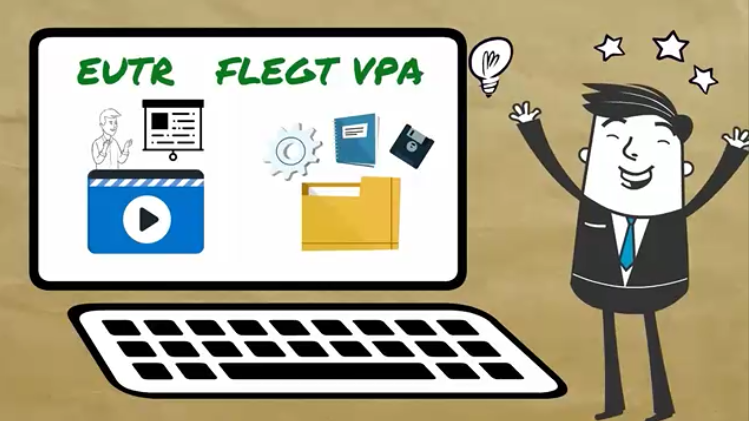
The project team has spent its first two years working with Vietnamese SMEs, timber associations, and other NGOs and programmes on FLEGT to develop this set of training materials.
The most recent versions of these materials have taken in feedback collected through training workshops with CSOs, enterprise visits, and stakeholder consultation meetings. This process is to ensure the training materials fill the information gap on FLEGT among CSOs and SMEs and are understandable by its targeted learners.
“We have been to almost every key timber processing zone in the country: up in the north in Lang Son Province, or traditional craft village in Bac Ninh, and down to the South in Dong Nai, Binh Duong, and Binh Dinh, and of course provinces in the Central region such as Hue and Quang Tri. And many places we visited not just once. Talking with small and medium timber companies and seeing how they operate in reality help us understand the practical issues that might hamper them from effectively complying with the requirements”, said Ms Lien.
Indeed, all those facts have enriched the formulation of the training materials and tools the project has developed for enterprises in the timber sector. Ms Weddle explained, “Timber companies, particularly small and medium ones, need something easy to digest and ready-to-use”.
“We always ask our trainees how each section is understandable to them. And thanks to their comments, sometimes even just a question, helps us keep improving the training materials after each training course”, Ms Weddle expressed.
“All inputs and recommendations are invaluable contributions to the development of the materials” added Ms Weddle.
Training sessions with a click
Fifty-nine trainees have learned about FLEGT from four project training courses since last year. But the number of interested learners seems to outweigh the project capacity to conduct in-person training sessions within its period.
Based on this set of training materials, an online platform is set to widely share essential knowledge on the topics to interested stakeholders - those could not attend the in-person training by the project.
 “The resource aims to benefit a variety of stakeholders, such as timber enterprises, timber associations, non-governmental organisations, institutions working in timber industry who would like to have more detailed understanding of the above subjects”, introduced Ms Weddle.
“The resource aims to benefit a variety of stakeholders, such as timber enterprises, timber associations, non-governmental organisations, institutions working in timber industry who would like to have more detailed understanding of the above subjects”, introduced Ms Weddle.
Any learner can freely access to the online training platform and select a range of presentation videos, free downloadable tools and materials, as needed. The platform is also built with quizzes to assist online learners to test their knowledge and track their learning.
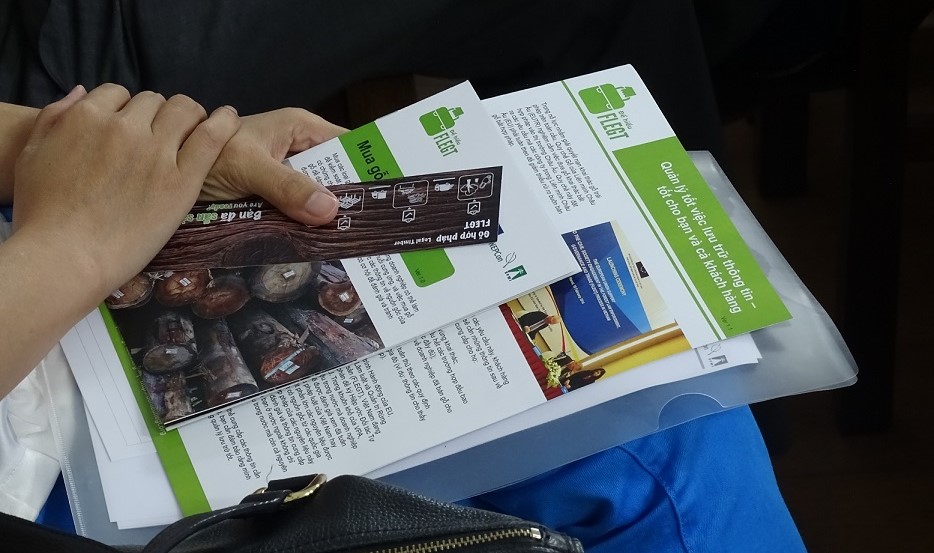 Although developed for a Vietnamese audience, the topics covered in the online training platform are relevant for timber companies globally, particularly those based in other VPA countries and inside the EU.
Although developed for a Vietnamese audience, the topics covered in the online training platform are relevant for timber companies globally, particularly those based in other VPA countries and inside the EU.
The platform also provides a comprehensive list of tools specifically designed for SMEs working in the timber industry. Interested timber companies can use these tools for their business operation to improve compliance to applicable timber legality requirements. The toolkit contains guidance documents, checklists, and templates that are ready for use.
“The toolkit provided by the project are very useful that helps enterprises to evaluate and manage the timber sources’, commented Mr Huynh Van Cuong, Director of Ngan Dai Son – an SME specialising in children’s furniture in Dong Nai Province.
“Two local NGOs and one timber association have so far made use of our training materials for their project training events pertaining to FLEGT, and a few others have planned to do so”. Ms Lien believes with these materials now published online, a broader group will benefit from this FLEGT resource.
“Even after the project ends in February 2017, NEPCon will maintain this online training resource to enable as many users to benefit from it as possible”, stated Ms Weddle.


